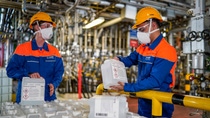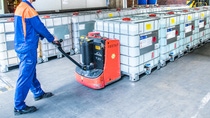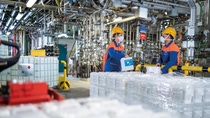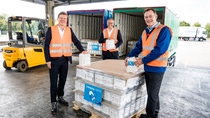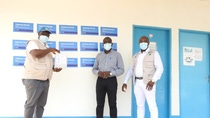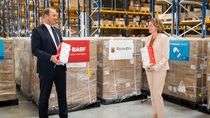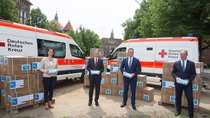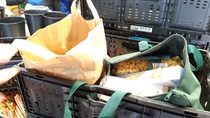Sustainability
Helping Hands
Civil society, government, business and the nonprofit sector must work closely to overcome the global coronavirus pandemic. Our Helping Hands aid campaign contributed to the fight against the novel coronavirus – as part of society, as a partner at our sites and as an international company. We used our expertise in research, production, procurement and logistics to help during the crisis.

Our activities to fight the coronavirus were wide-ranging: We produced and donated disinfectant, supplied personal protective equipment, supported medical facilities and food bank initiatives, and contributed our expertise to medical research.
Production and donation of desinfectants
Within a very short period of time, we modified production processes at plants in different countries to manufacture urgently needed disinfectants – products that are not usually part of BASF’s portfolio. Employees in countries such as Brazil, Germany, France, the Netherlands, Switzerland, Spain, Turkey and the United States helped to avoid local bottlenecks with their team spirit and great flexibility. In Europe alone, BASF produced more than 900,000 liters of disinfectant between March and December and donated this to hospitals, medical workers, care homes, local government, educational institutions and nonprofit initiatives such as UNO-Flüchtlingshilfe, the German partner of the U.N. refugee agency.
Our activities to fight the coronavirus were wide-ranging: We produced and donated disinfectant, supplied personal protective equipment, supported medical facilities and food bank initiatives, and contributed our expertise to medical research.
Production and donation of desinfectants
Within a very short period of time, we modified production processes at plants in different countries to manufacture urgently needed disinfectants – products that are not usually part of BASF’s portfolio. Employees in countries such as Brazil, Germany, France, the Netherlands, Switzerland, Spain, Turkey and the United States helped to avoid local bottlenecks with their team spirit and great flexibility. In Europe alone, BASF produced more than 900,000 liters of disinfectant between March and December and donated this to hospitals, medical workers, care homes, local government, educational institutions and nonprofit initiatives such as UNO-Flüchtlingshilfe, the German partner of the U.N. refugee agency.
Use of our procurement networks
Given the strained supply situation at the beginning of the pandemic, we used our procurement networks to purchase more than 100 million protective masks and donate these to the Federal Republic of Germany and the state of Rhineland-Palatinate. We also supported local healthcare facilities in many other countries, including Belgium, Brazil, China and the United States, by providing masks, protective eyewear, protective clothing and materials to produce visors free of charge.
With our ‘Helping Hands’ initiative, we provided assistance from the very beginning of the pandemic.”
Assistance initiatives and programs for those in need
Together, BASF SE and BASF Stiftung also established assistance initiatives and programs for those in need. An assistance fund focused on organizations that provide and distribute food to those in need. Other institutions, individuals and BASF employees could also donate to the fund. BASF Stiftung provided assistance to those who have suffered long-term loss of income due to COVID-19 illness or whose households were in financial distress as a result of the pandemic. We also donated to hospitals and healthcare providers in the communities surrounding our sites in China, India, Italy, South Korea, Poland and Spain, for example.
BASF infrastructure supports active ingredient search
We also made our expertise and infrastructure available for research into the virus, for example in the search for active ingredients to treat COVID-19 patients. Our supercomputer Quriosity identified and optimized promising molecules for public research projects. In addition, we opened our expertise and laboratory facilities to TÜV Nord at the BASF Innovation Campus in Shanghai, China, where quality checks on protective face masks were conducted on behalf of the German Federal Ministry of Health.
